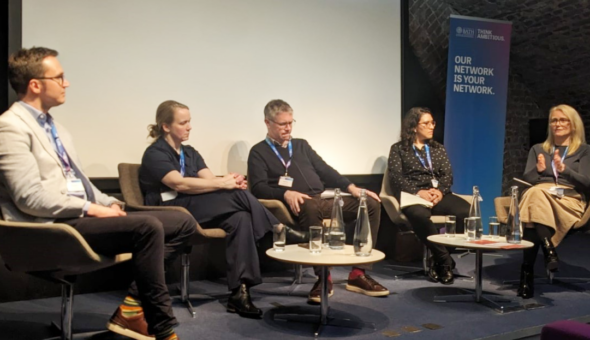Facebook, climate catastrophe, the arrest of Nissan’s chairman, a record-breaking money laundering scandal, and the Huawei spying scandal top our list of the biggest responsible business stories of 2018. Andrew Crane and Sarah Glozer talk us through their Top 10 stories of the year. If you have others you want to add, then join the conversation in the comments.
- Facebook’s privacy scandal
Facebook has endured a tumultuous year. A company that seemed to be impervious to criticism has found itself embroiled in a huge data privacy scandal from which it is still reeling. Revelations that the company played fast and loose with users’ personal data came to a head with the Cambridge Analytica revelations in March 2018, and spiralled to include allegations of spreading fake news, election interference, and deliberate targeting of the firm’s critics, including George Soros. While Facebook CEO Mark Zuckerberg was hauled up to testify to the US Congress, COO Sheryl Sandberg has turned from being a feminist role model to a corporate villain, users have departed in droves, and the company’s stock market valuation has crashed after years of sustained growth. Facebook will be hoping that its measures to stave off regulation and address privacy concerns will make 2019 a turnaround year for the beleaguered giant.
- IPCC climate catastrophe report
We have 12 years to avert climate catastrophe. That was the sobering message of the October 2018 report from the UN Intergovernmental Panel on Climate Change (IPCC), which signalled that “urgent and unprecedented changes” were needed to keep global warming to a maximum of 1.5C and avoid risks of extreme heat, drought, floods, and poverty for hundreds of millions of people. The report was significant because it demonstrated clearly that restricting global warming even to 2C, as has been largely baked into climate policy, would no longer be sufficient to avoid hugely negative consequences. As The Economist noted, “the scale of the effort required is unprecedented.” The report continued, “to achieve 1.5°C, the world would by 2050 need to eliminate all 42bn tonnes of carbon-dioxide in annual emissions. Renewables, including hydropower, would have at least to treble their share of electricity generation from today’s 25%. Internal-combustion engines, which power 499 out of 500 cars on the road today, would have to all but vanish. Progress is being made. The number of electric cars on the road is rising fast; green finance is gathering momentum; zero-carbon technologies are being developed.”
Unfortunately, the business reaction has been remarkably muted. The report comes in at number 2 on our list not because it was the most talked about responsibility story among companies or business policy makers but because it should have been. This was the wake-up call we all needed. The corporate responsibility community cannot afford to ignore this.
- Carlos Ghosn’s arrest
There have been a number of CEO departures in 2018 for perceived ethics violations, but top of the lot was this one. When Nissan Chairman, Carlos Ghosn was arrested in November 2018 on suspicion of financial misconduct, it sent, as the BBC put it, “shockwaves through the global car industry.” Ghosn was a hugely powerful player in the automotive market. As the head of the alliance of Nissan, Renault and Mitsubishi, he oversaw the production of one of every nine cars sold around the world. His arrest followed an internal investigation at Nissan which apparently uncovered "significant acts of misconduct" over many years, including understating millions of dollars of personal income in financial reports and misusing company assets for his own benefit. Following his arrest, Ghosn was fired by Nissan and Mitsubishi and sidelined (but not at the time of writing removed) from Renault. It is not clear yet whether Ghosn is truly guilty, or even why Nissan has chosen to pursue legal prosecution for one of its insiders. Rumours of a “palace coup” to stop a leader who had become too powerful were reported by CNN and the case is certainly unusual by Japanese standards, where companies are usually criticised for trying to cover up ethics and governance violations, not going public with them. This one looks likely to continue to dominate headlines in 2019 as more details emerge.
- Danske Bank money laundering scandal
Denmark is not usually the place you go looking for major corporate scandals. So it is with some surprise that our #4 story features the country’s largest financial institution, Danske Bank, which in 2018 admitted to its part in what looks to be Europe’s (and possibly the world’s) biggest ever money laundering scandal. An independent investigation found that around €200 billion of questionable money flowed through the Danish bank’s Estonian branch from 2007-15. Given that the GDP of Estonia in 2017 was only €29 billion, the scandal poses serious questions over the ability of companies and regulators to tackle money laundering despite years of reforms. Banks are supposed to now know their customers in order to prevent money laundering and other criminal activities occurring in their systems, but in the case of Danske Bank, they apparently had little oversight of their Estonian operation which allowed Russian and Eastern European non-resident customers to transfer billions of illegal money through the branch. The events prompted the resignation of Danske Bank’s CEO and such was the scale of the scandal that the credit rating agency Standard and Poor’s warned Denmark that it might even lead to cuts in the entire country’s credit rating.
- Huawei spying scandal
The final weeks of the year brought to a head one of the strangest corporate responsibility scandals of the last twelve months, but one that could turn out to be the most significant for global affairs. Huawei, the Chinese technology company, had (along with ZTE) been the subject of warnings from the US intelligence community back in February amid concerns that their products and services could be used for espionage. Pressure was ramped up in December when the US warned its allies in countries such as the Germany, Italy and Japan about cyber security concerns regarding the company. Sure enough, the UK telecoms infrastructure company confirmed it was removing Huawei equipment from its 4G network, while various countries started banning or limiting its access to new 5G networks. The story took a new turn when Huawei’s CFO, Meng Wanzhou, was arrested in Canada in December while changing planes at the request of US authorities. The charge: allegedly helping cover up violations of sanctions on Iran , an accusation allegedly based on information provided by Huawei’s compatriot tech company ZTE. Chinese authorities responded furiously to the arrest, including tit-for-tat detentions of Canadians in China, ramping up geo-political tensions that were already unsettled due to the ongoing trade disputes between the US and China. Huawei is a successful global company with well-known links to the Communist party in China. But as a number of commentators remarked, the US also has hardly been immune to using tech companies to spying on people – albeit its own citizens rather than those of its trading partners. While it is anyone’s guess where this particular spat will lead, it is clear that tech companies are not only increasingly facing more complex privacy issues, but they are also embroiled in simmering geo-political tensions.
- Nike’s Kaepernick campaign
"Believe in something. Even if it means sacrificing everything.” These were the stark words spoken by Colin Kaepernick, former NFL quarterback, at the end of Nike’s newest advertising campaign, launched in September. In its choice of Kaepernick as spokesperson, the campaign – which celebrated 30 years since the launch of Nike’s iconic “Just Do It” motto – packed a powerful socio-political punch. The message? We need to take racial injustice seriously. Kaepernick became a social justice campaigner after famously kneeling during the US national anthem to protest against police brutality. Many applauded Nike for using its brand to advocate for equality and civil rights and to speak out against deep racial tensions in the US. Others, who saw Kaepernick’s actions to be disrespectful and unpatriotic, called for a boycott of Nike’s products in protest of the brand actively co-opting politics for commercial gain. A #Justburnit online campaign ensued. Yet, as the dust settled, the fall out shifted in Nike’s favour. Not only was the brand seen to be more relevant amongst its target market, but the advert reportedly added $6billion to the company’s market value. A new dawn, it seems, has been entered for corporate political activism.
- Starbucks’ racism problem
Nike wasn’t the only US multinational getting itself wrapped up in debates about race in 2018. Starbucks though has been here before after its ill-advised #racetogether campaign that saw the company trying to start a conversation in store about race by getting baristas to write on coffee cups was quickly closed down in 2015 after widespread criticism. This year, the stakes were raised when the company was accused of racial profiling after two black men were arrested for “trespassing” after using the washroom in a Philadelphia store. Video of the incident went viral, soon followed by reports of more such incidents as well as protests at Starbucks stores. In an unprecedented move, Starbucks Chairman Howard Schultz called the incident "reprehensible" in an open letter to customers, and announced that the company would close all its 8000 US stores for an afternoon of racial-bias training. With the shutdown estimated to cost some $16m on top of the $16m already lost in negative publicity from the Philadelphia incident, it was a bold move from the coffee chain. While the company acknowledged that a few hours of training would not solve the issue, it declared that it was "deeply committed to this being a long-term journey”, highlighting the complexity of this issue not just for the company, but the country as a whole. “We need to talk about race in America” he declared.
- China’s vaccine scandal
Barely a year goes by without a major drug or food safety scandal occurring in China. They have become so common that they often barely even register on the international newswires. However, 2018 saw one of the biggest yet when the Changchun Changsheng Biotechnology Company was found to have produced faulty vaccines that were given to almost a million children and babies in the north east of the country. According to the New York Times, the company was found to have deliberately used expired vaccine materials and then destroyed and fabricated records to cover up their illegal practices. The scandal rocked the country, sparking a social media backlash and even a rare public protest outside government offices. The response from the Chinese government suggests that they have finally run out of patience with the food and drug industries, with a record $1.3bn fine meted out to Changchun Changsheng even though, to date, there is no evidence that the vaccines were actually harmful beyond simply being ineffective. With the fine set to force the company out of business, observers remarked that the size of the payment dwarfed previous penalties. With the Chinese President, Xi Jingping himself labelling the case as “hideous” the government moved quickly to introduce a new vaccine law to improve consumer protection, deter non-compliance, and start to restore confidence among an increasingly insecure population.
- Google’s sexual harassment protests
In November, thousands of Google staff across the world took to the streets to protest against sexual harassment, racial and gender inequality, and unequal pay. The ‘Walkout for Real Change’ followed news that the firm had paid out a severance package of around £70m to one of its top execs, despite the fact that accusations of sexual misconduct had triggered his departure. Participating employees were encouraged to leave a note that said: “I’m not at my desk because I’m walking out in solidarity with other Googlers and contractors to protest against sexual harassment, misconduct, lack of transparency and a workplace culture that’s not working for everyone.” In casting the darling of Silicon Valley under a dark spotlight, the move prompted new sexual harassment and assault policies in the company. Conversely, the protest may also boost the brand’s reputation in showing that Google employees, 60% of whom joined the movement, do stand up for the ‘right thing’ and are willing to make a difference. What is left to be seen is how the sexism arguably endemic within big tech, is to be addressed on a more industry-level scale. Let’s hope Google’s new policies signal the future for a fairer and more diverse culture within big tech.
- Paul Polman’s retirement
As the Financial Times recently stated, the Unilever CEO Paul Polman “was a standout CEO of the past decade”. Few in the corporate responsibility field would disagree. Since he took the reins at the head of the Anglo-Dutch consumer goods company in 2010, Polman has been a tireless proselytizer of a different, more long-term, and more sustainable way of doing business. He famously announced on his first day in the job that the company would cease providing quarterly guidance to investors. And his vision for Sustainable Living at Unilever has provided a strategic roadmap that has marked out the company as a genuine sustainability leader among large multinationals. Unilever’s announcement towards the end of 2018 that Polman would be retiring at the end of the year therefore marks the end of a remarkable era. As anyone who has heard him speak would agree, Polman is a powerful and persuasive orator, and someone who clearly believes in what he is saying. More than that, he backed up his words with genuine action while at the head of Unilever. He will be sadly missed in 2019 but we are sure he will be back with a new role, and a new mission, very soon.
There are always more big corporate responsibility stories than we can cram into our top ten, but do tell us about your top picks in the comments. And here’s hoping to for a more sustainable and socially responsible 2019!




One more big scandal from Denmark
https://fagbladet3f.dk/artikel/kurt-beier-notified-trafficking-four-countries